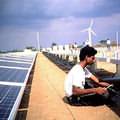|
事實上,用以計算一個經濟體所有貨物及服務產值的指標──「國內生產毛額」(GDP),在許多方面都是有問題的。比方說,重大石油外溢事故的處置過程中,包含場址清理、復原、官司費用等的花費,均會大幅增加國內生產毛額;但精神與環境等層面損失的價值卻不被列入計算。挪威、加拿大、還有瑞典等國家都嘗試採用「綠色」會計帳來計算國家收入,可是不論是環境損害的經濟衝擊、或是保育帶來的經濟效益,有關這方面的資訊實在是太少了。

身為一個尊重環境及傳統價值的林業工司,加拿大的伊沙克(Iisaak)公司將作業範圍限制在卑詩省的格里夸灣一帶。(照片提供:保育經濟網,攝影:Cindy
Hazenboom)
「因為缺乏資料,所以政府及企業根本沒有辦法去比較確實的花費和收益。」畢夏普博士說道:「此時此刻,大多數政府投入的心力還太少,不足以將環境變遷量化為經濟用語並作成報告。」不過,倒是有一些新發展出來的架構如「全球回報計畫」(Global
Reporting
Initiative)等,用來協助公司和一些非營利組織,從狹隘的財務報告方式,轉向為考量了社會、生態還有經濟層面的「三重底線」(triple
bottom line)報告方式。
此外,一些國家在環境政策上的努力,也可能被因加入世界貿易組織(WTO)而被自身所頒行的貿易法規所破壞。部分人士不滿地指出,環保問題常常都被貿易上的優先考量所遮蓋住了。
舉個例子,在1990年代早期一些歐洲政府曾經因為濫伐與森林消退的關連而考慮禁止熱帶雨林的木材進口,但最後卻因為這類提議違反了世貿組織相關規定而被迫放棄。
同樣的,近年來歐洲市場對基因改造生物體傳佈的關切,也觸犯了世界貿易組織有關貨品流通自由化的規定。另外,基於180多個國家所批准簽署的《生物多樣性公約》,國際間已達成基因資源公平分享的共識,但此一共識也和世貿組織有關智慧財產權的規定相牴觸,至今爭議未解。
「若一個國家想選擇較具永續性的產品與服務,是否合於貿易規定?面對這類問題,現行的規定顯曖昧不清。」畢夏普博士說:「這是一個尚未被真正解決的議題。許多消費者希望可以以此做為消費時選擇的基準,但是現存的貿易規定似乎排除了這種選擇的可能性。」
一個利用市場來達成環保目標的例子是「清潔發展機制」(CDM)。「清潔發展機制」的設計,是為了協助參與京都議定書的工業國家,在花費較少的條件下──因此也是在政治上較容易被接受的條件下,讓這些國家履行溫室氣體排放減量的義務。
清潔發展機制的觀念其實很簡單:例如,一個工業化國家可以在發展中國家投資風力發電來取代需要燃煤發電,藉此減少溫室氣體的排放;而參與這類投資的工業化國家,可獲得相應的溫室氣體減量「點數」(credit),這些「點數」便可併入該國應達成的溫室氣體減量額度之內。
不過,清潔發展機制還是有很多待改善的地方。「清潔發展機制對造林、再生能源等特定類型的計畫,發揮了很大的推動力;」波昂的IUCN環境法律中心法務專員馬革雅特(Maria
Socorro Manguiat)說:「但這項機制需要更嚴格的界定,才能確保它會發揮效用。這類投資計畫的規模通常並不大,相關的成本問題、草根階層參與等問題,也逐漸成為一項挑戰」

NEPC-Micon Limited與Omnion Power Engineering
Corporation兩家公司,在印度可音巴托南方的Coimbatore風電場裝設地面型太陽光電系統,總發電量達100千瓦。(照片提供:應用動力公司)
除了碳排放議題,IUCN也在尋求諸多可能性,尋求為生態服務開發出市場誘因的機會,希望藉此創造出保育、永續及公平利用方面的新投資。
舉例來說,在巴西的某些地方,農民會付錢請養蜂人把蜂巢養在農作物附近;而這些蜜蜂會促進農作物的授粉作用,提高農民的報酬,足以抵銷僱請養蜂人的額外開銷。
另外在哥斯大黎加,也有一家啤酒廠會付錢請上游的農家減少使用肥料,並保留河邊的樹木以幫助過濾水源。這樣做的結果是,消費者有更好的啤酒可喝、農家的收入增加、還有對環境衝擊的減少。
若將規模放大到國際層面,運用這些策略的挑戰性就更大了。想要保育森林,那你要如何彌補那些靠伐木生存的窮國?若是要採礦,你又要如何去彌補那些關心棲息地流失的人?有一個可能的方法是像目前印尼的天然氣開發策略:私人投資者同意設立一個保護區,並對地方環保機構提供資金,以部分彌補開採天然氣時對生態無可避免的傷害。
(待續) |
|
Gross Domestic Product (GDP), a key measure of national accounting
systems which describes the market value of all goods and services
produced in an economy, is flawed in many ways. Major oil spills,
through cleanup, site remediation, and legal costs actually boost GDP,
while spiritual and other values of the environment go unaccounted. Some
countries, such as Norway, Canada and Sweden, have attempted to 'green'
their national income accounts but information on the economic impacts
of environmental damage or the economic benefits of conservation remains
very scarce.

Iisaak is an ecologically sensitive forest services
company built on traditional values and respect for the environment.
Iisaak operates exclusively within Clayoquot Sound, British Columbia.
(Photo by Cindy Hazenboom courtesy Conservation Economy)
"We don't have the data, so governments and companies can't compare
the true costs and benefits involved," said Dr. Bishop. "At the moment,
most governments make little effort to quantify and report on
environmental change in economic terms." New frameworks, however, such
as the Global Reporting Initiative, are helping companies – and some
non-profit organizations – shift from narrow financial to "triple bottom
line" reporting, which includes social and environmental as well as
economic impacts.
Environmental policies can also be undermined by trade rules
promulgated by the same countries through the World Trade Organization (WTO).
Some argue that all too often, trade takes precedence over environmental
concerns.
In the early 1990s, for example, some European governments considered
banning imports of timber from tropical forests, based on concerns about
the link between logging and deforestation. The proposals were dropped
as they would have been illegal under WTO rules.
Similarly, recent concerns in Europe about the spread of genetically
modified organisms have come up against WTO rules on the free movement
of goods. Conflict between WTO rules on intellectual property and the
international commitment to equitable sharing of the benefits of genetic
resources under the Convention on Biological Diversity ratified by over
180 countries is yet another unresolved issue.
"Existing trade rules are ambiguous when it comes to whether
countries can discriminate in favour of sustainably produced goods and
services," said Dr. Bishop. "This is an issue that has not really been
resolved. Many consumers want to make decisions on this basis, but the
existing trade rules often seem to rule out such distinctions."
Another example of using markets to achieve environmental aims is the
Clean Development Mechanism (CDM). The CDM is designed to make it less
costly - and thus politically more acceptable - for industrialized
countries to meet their obligations under the Kyoto Protocol to reduce
greenhouse gas emissions.
The idea is simple: an industrialized country may invest in a wind
power project in a developing country, for example, thus supplying
electricity that would otherwise have been produced by burning coal. The
industrialized country investing in the project can then claim credit
for the greenhouse gas emissions that have been avoided, and use these
credits to meet its own national target.
However, there is still work to be done on perfecting the CDM. "The
CDM has given an important push to certain types of projects, such as
reforestation and renewable resources," said Maria Socorro Manguiat,
legal officer for the Bonn based IUCN Environmental Law Centre. "But CDM
requires stringency to ensure that it works. That involves costs and at
grass-roots level that becomes more of a challenge because of the small
size of the projects."

NEPC-Micon Limited/Omnion Power Engineering Corporation
is installing a ground mounted 100 kilowatt photovoltaic system, at a
NEPC-Micon wind farm south of Coimbatore, India. (Photo courtesy Applied
Power Corporation/NREL)
In addition to carbon, IUCN is investigating many other opportunities
to develop market-based incentives for ecosystem services. These can
generate new investment in conservation and encourage sustainable and
equitable use.
In parts of Brazil, for example, farmers pay bee-keepers to maintain
hives near their crops. Farmers recoup this additional cost thanks to
enhanced pollination.
In Costa Rica, one brewery pays farmers upstream to reduce their
fertilizer use and to retain trees along the river's edge to help with
filtration. The result? Better beer for the consumer, increased income
for the farmer and reduced environmental impacts.
On an international scale, such incentives can be more challenging.
How do you compensate poor countries that depend on logging for the lost
opportunities of forest conservation? How can you compensate people
concerned about habitat loss for the impacts of mining? One possible
response is illustrated by a natural gas project in Indonesia, where
private investors have agreed to create a protected area and to fund
local environmental agencies as partial compensation for the unavoidable
impact of the project. |
